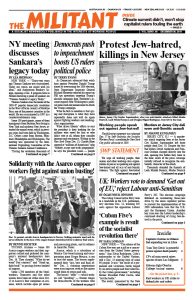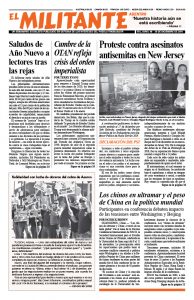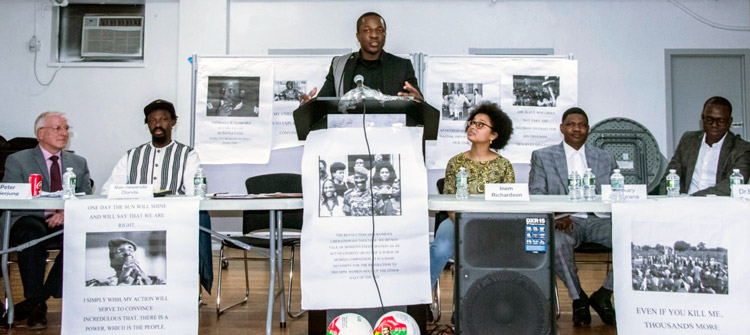NEW YORK — “Thirty-two years ago Thomas Sankara was assassinated. Today our voices are raised with his ideas,” said chairperson Boukary Salogo, opening a Dec. 8 program here in Harlem featuring a panel of speakers on “Thomas Sankara’s Legacy Today.”
Thomas Sankara was the leader of the 1983-87 popular democratic revolution in the West African country of Burkina Faso, one of the poorest countries in the world. He was assassinated in 1987 in a counterrevolutionary coup.
Some 100 participants, many of them immigrants from Burkina Faso living in New York and northern New Jersey, attended the annual event, which in previous years had been held in Washington, D.C. Others came from Boston, Montreal, Philadelphia and Washington. The meeting was sponsored by the International Organizing Committee of the Thomas Sankara Annual Conference.
“During the revolution thousands of schools were built, not only in the cities but in every village,” said Basninwende Isonore Dianda, a grade school teacher in Harlem. Before the 1983 revolution, he said, “education was considered a privilege for those who could afford it. Sankara wanted everyone to have access to education. A high priority was placed on girls getting an education.” Following the defeat of the revolution, these gains were reversed.
Inem Richardson, a Barnard College student, told the audience she first learned about Thomas Sankara in high school when a popular uprising in Burkina Faso drove Blaise Compaoré from power in 2014. For 27 years Compaoré, who organized the counterrevolutionary coup in 1987 and was responsible for Sankara’s assassination, had ruled the country with an iron fist.
“Sankara is talked about as if he emancipated the women of his society,” Richardson said. But pay attention to Sankara’s own words: “Emancipation, like freedom, is not granted, it is conquered. It is for women to put forward their demands and win them.”
Richardson pointed to the changes women fought for, with Sankara’s leadership and backing. Female genital mutilation, forced marriages and polygamy were outlawed. Sankara understood that women’s position in society is not a product of nature but of history, Richardson said.
“President Thomas Sankara was a visionary, a man of integrity,” Issa Zoungrana, a representative of Stand for Life and Liberty, said. Sankara’s “primary battle was the well-being of the people. All his actions on political, economic, social and cultural levels were aimed at achieving this objective.”
“Sankara was a nationalist, anti-imperialist, and anti-neocolonial,” Zoungrana said. Under his leadership, Burkina Faso became a country respected for its achievements in education, access to clean drinking water and the fight against corruption.
Sankara’s kind of leadership is not to be found on the African continent today, Zoungrana said. Hope lies with the youth in Africa and the diaspora who can learn from Sankara’s example.
Fights of Africans, US Blacks linked
Boukary Sawadogo, a professor at City College of New York, focused on what has changed in the world since Sankara spoke to a meeting here of more than 500 in Harlem in 1984.
Sawadogo discussed the historic connections between African liberation struggles and the fight by Blacks in the U.S. against racism and Jim Crow segregation. He said some 10,000 immigrants from Burkina Faso now live in New York. “The issues for unity of Africans and African Americans are still on the table,” he said. “We have to stick together.” Sankara’s speech in Harlem, Sawadogo said, offers a perspective to advance that unity.
“French ground troops were recently introduced for the first time in Burkina Faso, and the Pentagon organized Special Operations exercises there in February,” Peter Thierjung of the Socialist Workers Party said. “Both are aimed at shoring up an unstable regime that has lost control of nearly half the country. Reactionary Islamists and armed gangs with connections to Compaoré have carried out terrorist attacks. A war and crisis are unfolding in West Africa, tearing countries like Burkina Faso apart. The responsibility for this can be traced back to the 1987 counterrevolution led by Blaise Compaoré.”
Sankara’s rejection of the dog-eat-dog morality of capitalism is an important lesson for working people in the U.S., Thierjung said. Today the effects of the competition between Uber, Lyft, taxi companies and limo services are imposed on 120,000 drivers in New York, many of whom are from West Africa and other parts of the world. Drivers “are supposed to see each other as the problem,” Thierjung said, but they need to build solidarity and organize one union for all drivers instead. “That would be Sankara’s way.”
Read Sankara in his own words
Thierjung and Zoungrana both urged participants to read Thomas Sankara Speaks, a book of speeches by the revolutionary leader. “There are those who wanted to bury Sankara and his ideas with him, but the book is a pledge to not let that happen,” Thierjung said. “Read Sankara in his own words.”
A lively discussion followed the presentations, with some 20 participants taking the microphone to speak, debate and pose questions.
One participant argued that “under Compaoré there was peace and negotiations, and terrorists were not carrying out attacks.” Another answered that there was never peace for the people of the country when Compaoré was in power. “Peace is what you earn” through struggle, he said.
“If you don’t do politics, politics will do you,” another participant said. “In Burkina Faso 70% are young and look to Sankara’s fight. We need to talk about what can be done right now. Not just talk.”
In reply to a comment about the Burkina Revolution’s impact in Latin America, Richardson, who had recently visited Cuba, pointed to the close relations between the Cuban Revolution and the revolution in Burkina Faso under Sankara.
Mary-Alice Waters, president of Pathfinder Press, publisher of Thomas Sankara Speaks, said, “The main purpose of this book is to get it into the hands of working people here.” She asked Sawadogo about the impact of Malcolm X in Africa.
Sawadogo replied that “between the approaches of Martin Luther King and Malcolm X, the fight for true independence would be to take the Malcolm X route.” Blacks in the U.S. and immigrants from Africa “have a common struggle,” he added.
“Some say Sankara led a coup d’etat in 1983, when he came to power. Is that right?” one participant asked.
“The 1983 revolution in Burkina Faso was not a coup, it was a popular uprising that thousands participated in.” Thierjung replied. “It was a popular democratic revolution led by Sankara.”
Paul Sankara, Thomas Sankara’s brother, spoke at the conclusion of the meeting. He thanked its organizers and appealed for support to his family’s fight to bring Sankara’s assassins to justice. “Each and every one of us has a voice to fight for justice for Thomas Sankara.”


